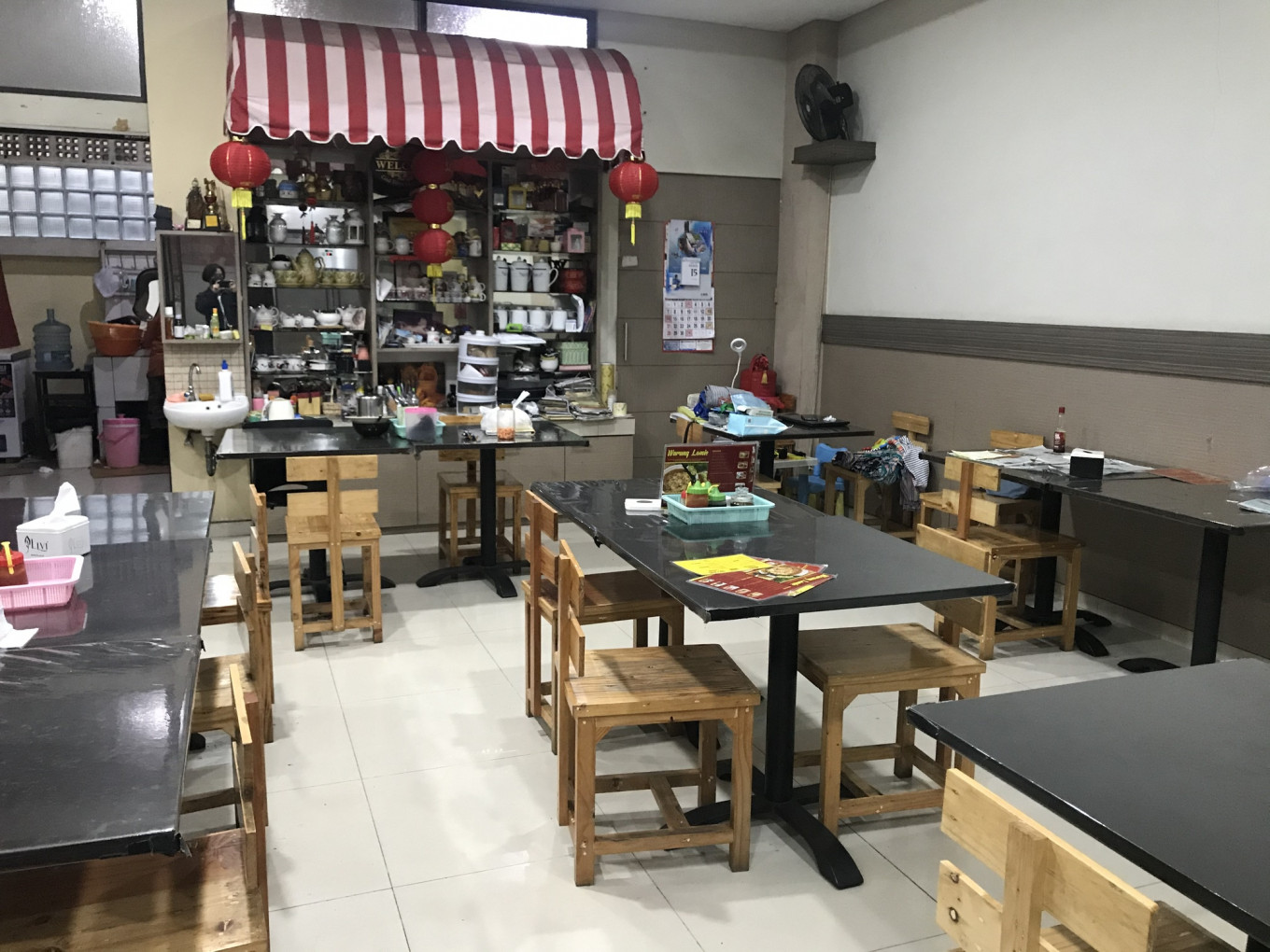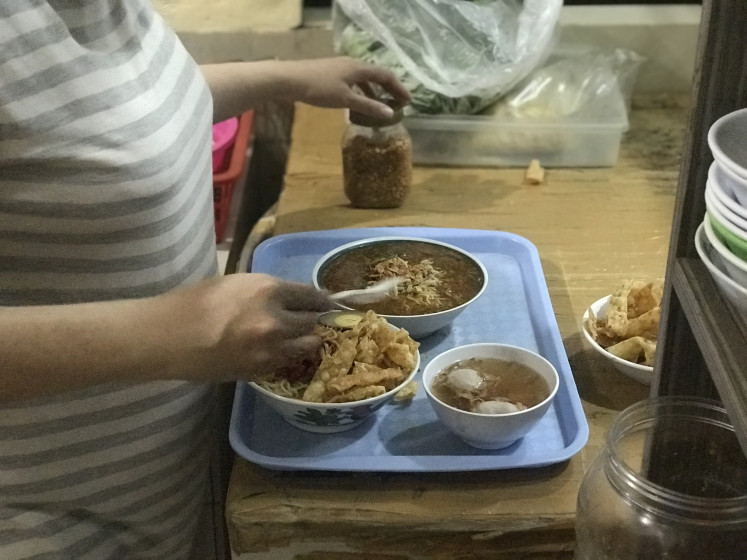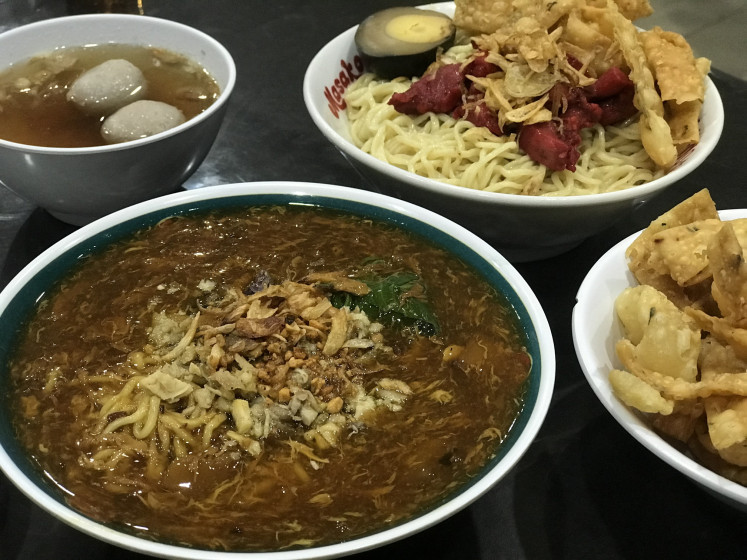Popular Reads
Top Results
Can't find what you're looking for?
View all search resultsPopular Reads
Top Results
Can't find what you're looking for?
View all search resultsPassion, comfort and legacy in a bowl of noodles
For many Indonesians, noodles have been as ubiquitous to their diet as rice, with noodle communities and bloggers influencing more people to get into the growing culinary trend.
Change text size
Gift Premium Articles
to Anyone
T
he day starts early for Cinthya Hadinata. At 5 a.m., the 59-year-old goes to the market to buy fresh produce. As soon as she’s back home, Cinthya begins preparing for her family’s small lomie (assorted noodles in sticky gravy-like soup) restaurant, simmering the soup for the day and preparing the key ingredients, among other tasks. By 7 a.m., customers start to arrive, ready for an early breakfast.
Tucked in a small street by Bandung’s popular Alun-Alun area in West Java, Warung Lomie — as her family restaurant is called — serves up classic Chinese dishes. Lomie is a Hokkien noodle dish, originally from Zhangzhou.
According to Cinthya, noodles are something that people do not easily get bored of.
“I feel what most Indonesians look for in a dish is its heartiness. It’s difficult to explain, but noodles are very easy for the taste buds. The sensation is different from rice, but the eating experience is similar,” added her daughter, Maria, 35.
Entrepreneur Chandra Arya, 33, feels the same, though his penchant for it is backed by nostalgia. When he was little, Chandra’s mother took him to eat noodles near Bandung’s Lodaya street. The taste left an impression on young Chandra, but because he now lives far away from Lodaya, those noodles are not something that he can have frequently. From there, his appreciation grew with time.
“I’m sure that all noodle enthusiasts have at least once tried [a variant] of noodles they didn’t enjoy,” said Chandra. He said this with certainty as he believes that for true noodle fans, what they see first is the bigger picture: the noodles themselves. Taste can come second.
Today, Chandra runs Bakmi Journal (@bakmi.journal on Instagram), a noodles-review account focused on noodle joints around Bandung, mostly the Chinese variants, from famed classics to random roadside stalls. In his reviews, Chandra primarily rates a noodle dish on its texture, aroma and taste. Other factors such as serving size, value for money and service also play a part in the overall score. And then there’s location.
Warung Lomie is located in Cinthya’s family home, with a warm ambiance to match. This makes it a favorite for a lot of noodle lovers. It almost feels like eating at home or a relative’s place, with Cinthya acting as the kind aunt who’s ready to spoil you with noodles.
Though she’s been at it for decades, Cinthya remains as hands-on as possible; she personally prepares all the ingredients, with decades-old recipes she developed herself.
Maria putting the finishing touches on the dishes. (JP/Almer Mikhail)This year marks the 20th anniversary of Warung Lomie. The restaurant started out as a small stall in front of Cinthya’s previous house near Kalam Kudus Church in Bandung. At first, she operated with just one cooking pot and a small number of tables. When the family’s contract with the landlord ended in 2013, Cinthya decided to move the entire family and their business to a new location. In 2015, Maria quit her job and started to help manage the restaurant full-time. It remains a family operation, with a staff of four long-time employees.
The move also prompted a name change from the original Lomie 76 to Warung Lomie, which carries a special meaning for Cinthya’s family. Warung Lomie’s purpose from the start is to serve authentic Chinese cuisine for everyone, which they’ve done by making the dishes halal and affordable.
Warung, as the mother and daughter duo said, is a place where everyone from all walks of life can come and enjoy good food together.
Guided by food bloggers
It can be said that for Indonesians, noodles have reached the status of comfort food, even surpassing rice in some ways. Unlike rice, noodles have inspired an almost cult following of passionate fans, including food bloggers like Chandra and communities like Bakmi Club in Jakarta. According to Chandra, this could be attributed to noodles’ versatility to be served in a lot of different ways and its multitude of variants. They can be cooked as an accompaniment to rice or stand alone as a main dish.
For some, noodles have special a meaning that’s connected to their culture. Tracing their long history from China, noodles transcended their beginnings to become something that is present in various cultures through migration and a series of acculturations. As culture is contained in cuisine; tasting noodles from different origins is a way of appeasing one’s cultural curiosity.
Noodle enthusiast Fajar Eka said he only started to appreciate noodles in a deeper way in 2017. He recalled that his coworkers at the time were fans of noodles and would often have bakmi (noodles) Tasik — from Tasikmalaya, West Java — for lunch. Before trying this, the 25-year-old associated noodles with mie bakso (noodle soup with meatballs) — he was not a big fan. After trying bakmi Tasik, however, he realized there was more to noodles than he initially thought.
He became an ardent follower of Bakmi Journal. He started trying out new noodle joints once a week, often guided by Bakmi Journal’s recommendations or just random curiosity. As his palate became more refined, he began documenting his adventures on Twitter as a way of benchmarking his evolving tastes. Among all he tried so far, his favorite falls to the iconic Mie Lezat (Delicious Noodles) of Bandung’s Luna alleyway, with his favorite noodle style being sweet bakmi.
Warung Lomie’s signature dishes, lomie and bakmi Medan, remains customers' favorite. (JP/Almer Mikhail)The recent years saw the noodle trend become more widespread, with new and more “youthful” noodle joints popping up around Indonesia’s bigger cities, most of them following the old school Chinese style. This is a phenomenon that Chandra is excited about, as he feels it will spread the culture and enthusiasm around noodles to a wider audience. On the other hand, Fajar is warier.
“It’s good as long as these newer noodle joints are still focusing on their food rather than their branding,” he said. “The most important thing is the noodles, not the chase for trends or virality.”
For others, noodles are more than just a culinary trend.
“It’s something you can never get bored of. Even if you had [noodles] today, you could eat it again tomorrow. There are always new noodle joints popping up because essentially, people love noodles,” Cinthya said.












